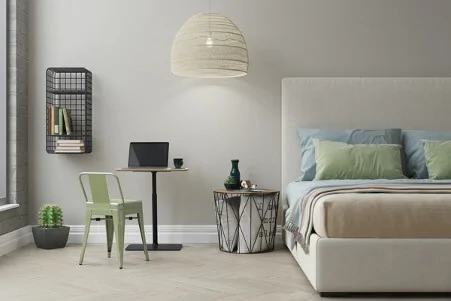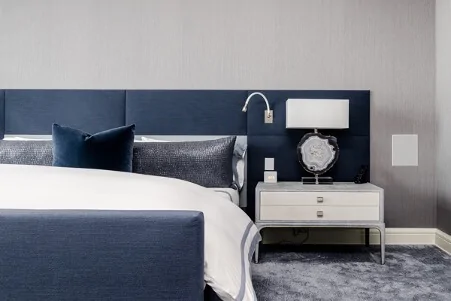- Updated :
- Published :
- Andy Reilly
- Interior Inspiration
- 0 likes
- 2909 views
- Tags: beds, sleep science, sleep guide, trouble sleeping
We talk sleep science here at Magna Beds
A good night’s sleep is vital, and it is no surprise that sleep science is a large industry. Enjoying great rest is one of the best ways to be healthy, active, productive and happy. Here at Magna Beds, the more we know about good sleep quality, the more we can help people achieve it.
Beds are our business, being highly interested in sleep science this article offers insight into what it is, why it matters, and what you can do to improve your sleep quality.
How much sleep do we need each night?
For adults, between 7 and 9 hours sleep per night is recommended by the Sleep Foundation.
What happens when we don't get enough sleep
If you struggle to enjoy good sleep regularly, you might suffer from the following issues:
- Health problems - If you don't get enough sleep, you may be at risk for various health problems. These include obesity, diabetes, heart disease, stroke, and high blood pressure. Sleep deprivation can also lead to an increased risk of accidents and injuries.
Struggling to concentrate - Another consequence of not enough sleep is that you may have trouble concentrating. This can make it challenging to perform well at work or school. You might also find it harder to pay attention to tasks and remember information.
- Easily irritable, suffering mood swings - Not getting enough sleep can also make you irritable and more likely to experience mood swings. You may be snapping at loved ones or overwhelmed by small tasks, and can be more prone to anxiety and depression when you're not well-rested.
- Your skin might suffer - It can also show in your appearance. You may have dark circles under your eyes, your skin may look tired and sallow, or you may notice that your hair is duller and thinner than usual.
- You could gain weight - Lack of sleep can also lead to weight gain. This is because sleep deprivation alters the levels of hormones in your body that regulate hunger and fullness. When these hormones are out of balance, you're more likely to feel hungry even if you've just eaten.
The benefits of a good night's sleep
A good night's sleep is essential for good health for the following reasons:
- Improve your improve mood and increase energy levels
- Improve cognitive function and memory
- Reduce stress and anxiety
- Boost the immune system
- Improve skin health

Recommendations for a better night’s sleep
Some tips to consider when looking to enjoy a better night’s sleep include:
- Establish a regular sleep schedule - This is on one of the best ways to ensure you get a good night’s sleep. Going to bed and waking up at the same time each day helps to regulate your body’s natural sleep rhythm and can make it easier to fall asleep and stay asleep.
- Create a soothing bedtime routine - Creating a soothing bedtime routine can also help you sleep better. Taking a warm bath, reading a book, or writing in a journal are all great activities to do before bed that can help you relax and prepare for sleep.
- Avoid caffeine and alcohol before bed - These are two substances that can interfere with sleep, so it’s best to avoid them in the hours leading up to bedtime. Caffeine is a stimulant that can keep you awake, while alcohol can make it difficult to fall asleep and can cause you to wake up during the night.
- Keep your bedroom dark and quiet - Your bedroom should be a quiet place where you can relax and rest. To promote better sleep, try to limit the amount of light exposure in your bedroom by using blackout curtains or an eye mask, and avoid using electronics such as TVs or laptops in bed. If needed, you should also try to reduce noise exposure by using earplugs or white noise machines.
- Make sure your sleeping environment is comfortable - For your body to fully relax and get a good night’s sleep, your sleeping environment must be comfortable. This means having the right mattress, pillows, and blankets for your needs and keeping the temperature in your room cool.
- Practice stress-reducing techniques during the day - If you feel stressed or anxious during the day, people can use several techniques to help reduce these feelings before bedtime. Some helpful strategies include yoga, meditation, deep breathing exercises, or journaling
What are the different sleep cycles?
There are four different sleep cycles that people experience throughout the night: light sleep, deep sleep, REM sleep, and awake time. Each sleep cycle has its distinct characteristics and lasts for a different amount of time.
- Light Sleep - Light sleep is the first sleep cycle stage and typically lasts 10-20 minutes. During this stage, people are not yet fully asleep and can be easily awakened. People in this stage of sleep may experience muscle cramps or a feeling of falling.
- Deep Sleep - This is the second stage of the sleep cycle and typically lasts for 20-40 minutes. During this stage, people are less likely to be awakened, and their breathing and heart rate slow down. People in this stage of sleep may experience vivid dreams or night terrors.
- REM Sleep - The third sleep cycle stage and typically lasts 60-90 minutes. During this stage, people are more likely to dream, and their eyes may move rapidly back and forth under their eyelids. People in this stage of sleep may also experience paralysis of their muscles.
- Awake Time - Awake time is the fourth sleep cycle stage and typically lasts 5-10 minutes. During this stage, people are fully awake and alert. People in this stage may experience anxiety or difficulty falling back asleep.

Ways to monitor your sleep
To improve your sleep, it is helpful to know how much sleep you get and if there are issues impacting your attempts to sleep.
- Keep a sleep diary or log - One of the best ways to monitor your sleep is to keep a sleep diary. In your sleep diary, you should track how long you sleep each night and how many hours you spend in bed. Additionally, you should note how rested you feel when you wake up in the morning and whether or not you experienced any disruptions during the night.
- Wear a sleep tracker - Another way to monitor your sleep is to wear a sleep tracker. Sleep trackers are devices worn on the wrist or ankle that track your sleep patterns. They typically use sensors to track your movement and heart rate, which can give you an accurate picture of how well you slept. Many leading brands operate in this field, including Apple and Fitbit, but many generic products provide helpful information for those on a more limited budget.
- Use an app - Several apps monitor your sleep. These apps typically use the sensors in your phone to track your movement and heart rate while you sleep. Additionally, they may use other data, such as the light and noise levels in your room, to give you a complete picture of your sleep quality.
Is tracking your sleep worth it?
Tracking your sleep is a valuable activity; it might pinpoint problems or issues with your health. However, the information itself isn’t worth much unless you act upon it. Knowing how to analyse findings or working out how you can improve results is crucial to ensure you enjoy a better night's sleep.
At Magna Beds, we know how vital sleep is, and we want to ensure you enjoy the best nights sleep, every night. To see the finest quality beds, ideal for your home, please check out our full range today.






